Related Research Articles
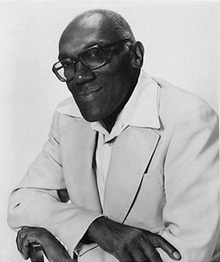
Benjamin Clarence "Bull Moose" Jackson was an American blues and rhythm-and-blues singer and saxophonist, who was most successful in the late 1940s. He is considered a performer of dirty blues because of the suggestive nature of some of his songs, such as "I Want a Bowlegged Woman" and "Big Ten Inch Record".
New jack swing, new jack, or swingbeat is a fusion genre of the rhythms and production techniques of hip hop and dance-pop, and the urban contemporary sound of R&B. Spearheaded by producers Teddy Riley, Bernard Belle, Jimmy Jam and Terry Lewis, new jack swing was most popular from the late 1980s to early 1990s.

This is a discography chronicling the musical career of James Brown. Brown joined Bobby Byrd's vocal group The Flames in 1953, first as a drummer, and then as leading front man. Later becoming The Famous Flames, they signed with Federal Records in 1956 and recorded their first hit single, "Please, Please, Please", which sold over a million copies.

"(If Loving You Is Wrong) I Don't Want to Be Right" is a song written by Stax Records songwriters Homer Banks, Carl Hampton, and Raymond Jackson. Originally written for The Emotions, it has been performed by many singers, most notably by Luther Ingram, whose original recording topped the R&B chart for four weeks and rose to number 3 on the Billboard Hot 100 in 1972. Billboard ranked it as the No. 16 song for 1972.

The Famous Flames were an American rhythm and blues, soul vocal group founded in Toccoa, Georgia, in 1953 by Bobby Byrd. James Brown first began his career as a member of the Famous Flames, emerging as the lead singer by the time of their first appearance in a professional recording, "Please, Please, Please", in 1956.
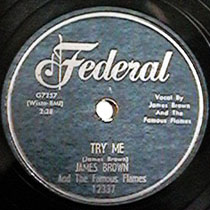
"Try Me", titled "Try Me (I Need You)" in its original release, is a song recorded by James Brown and the Famous Flames in 1958. It was a #1 R&B hit and charted #48 Pop—the group's first appearance on the Billboard Hot 100. It was Brown and the Flames' second charting single, ending a two-year dry spell after the success of "Please, Please, Please".
"(I Love You) for Sentimental Reasons" is a popular song written by Ivory "Deek" Watson, founding member of the Ink Spots and of the Brown Dots, and William "Pat" Best, founding member of the Four Tunes.
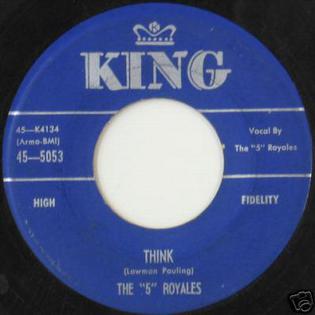
"Think" is a rhythm and blues song written by Lowman Pauling and originally recorded by his group The "5" Royales. Released as a single on King Records in 1957, it was a national hit and reached number nine on the U.S. R&B chart.
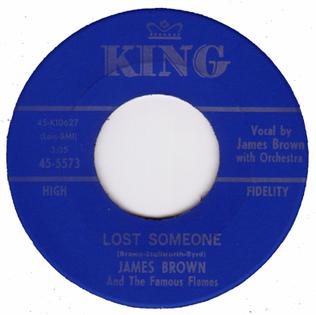
"Lost Someone" is a song recorded by James Brown in 1961. It was written by Brown and Famous Flames members Bobby Byrd and Baby Lloyd Stallworth. Like "Please, Please, Please" before it, the song's lyrics combine a lament for lost love with a plea for forgiveness. The single was a #2 R&B hit and reached #48 on the pop chart. According to Brown, "Lost Someone" is based on the chord changes of the Conway Twitty song "It's Only Make Believe". Although Brown's vocal group, The Famous Flames did not actually sing on this tune, two of them, Bobby Byrd, and "Baby Lloyd " Stallworth, co-wrote it with Brown, and Byrd plays organ on the record, making it, in effect, a James Brown/Famous Flames recording.
"Bewildered" is a popular song written in 1936 by Teddy Powell and Leonard Whitcup. It was a 1938 hit for Tommy Dorsey and His Orchestra.

"I Don't Mind" is a rhythm and blues song written by James Brown and performed by Brown and the Famous Flames. Released as a single in 1961, it reached number four in the R&B Billboard charts and number 47 in the Pop Billboard charts. Brown and the Flames also performed it on their 1963 album Live at the Apollo
"Oh Baby Don't You Weep" is a song recorded in 1964 by James Brown and The Famous Flames. Based upon the spiritual "Mary Don't You Weep", it was recorded as an extended-length track and released as the first two-part single of Brown's recording career. It peaked at #23 on the Billboard Hot 100 and at #4 on the Cash Box R&B Chart.. It was the last original song featuring the Famous Flames to chart, not counting the 1964 re-release of "Please, Please, Please" and the 1966 B-side release of the Live at the Apollo performance of "I'll Go Crazy".

Pure Dynamite! Live At The Royal is a 1964 live album by James Brown and The Famous Flames. Originally issued on King Records, it was the live follow-up to Brown's 1963 Live at the Apollo LP, and like that album, reached the Top 10 of the Billboard Pop album charts, peaking at #10. It was recorded live at the Royal Theatre in Baltimore, Maryland, a popular venue for R&B artists of the day. The album takes its title from Brown's most famous nickname at the time, "Mr. Dynamite".
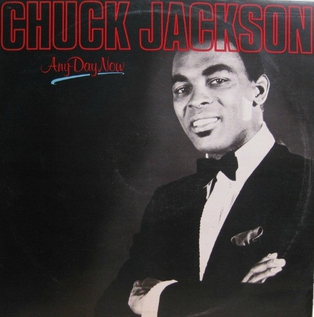
"Any Day Now" is a popular song written by Burt Bacharach and Bob Hilliard in 1962. It has been recorded by numerous artists over the years, including notable versions by Chuck Jackson in 1962, Alan Price in 1965, Elvis Presley in 1969, Scott Walker in 1973 and Ronnie Milsap in 1982. In the lyrics, the singer predicts the imminent demise of a romantic relationship and describes the sadness this will leave.
"I Can't Go on Without You" is a 1948 song by Bull Moose Jackson and His Buffalo Bearcats. The song was composed by Henry Glover and Sally Nix. The single was Jackson's most successful release on the US Billboard R&B chart, reaching number one for eight weeks.

Henry Bernard Glover was an American songwriter, arranger, record producer and trumpet player. In the music industry of the time, Glover was one of the most successful and influential black executives. He gained eminence in the late 1940s, primarily working for the independent King label. His duties included operating as a producer, arranger, songwriter, engineer, trumpet player, talent scout, A&R man, studio constructor, while later in his career he became the owner of his own label. Glover worked with country, blues, R&B, pop, rock, and jazz musicians, and he helped King Records to become one of the largest independent labels of its time. Thanks to the efforts of family, friends and fans, Glover's hometown of Hot Springs, Arkansas celebrated the 100th anniversary of his birth in 2021 by inducting him into the downtown "Walk of Fame," the Mayor's "Proclamation," "Key to the City," and named a parklet "Henry Glover Way," along Black Broadway after him. In 2018, Glover was recognized with a Lifetime Achievement Award by the King Records 75th Anniversary. In 2013, he was inducted into the Blues Hall of Fame.
"Just You and Me, Darling" is a song written by James Brown and recorded by Brown and The Famous Flames. Released as the B-side of Brown's 1961 cover of "I Love You Yes I Do", it charted #17 R&B. It also appeared on the album The Amazing James Brown.
"Right or Wrong" or "Right or Wrong " is a song written and originally recorded by Wanda Jackson, an American country, rock, and Christian music artist. Originally, the song was a major country and pop hit for Jackson in 1961. A second version was released in 1964 that became popular by American pop artist, Ronnie Dove.

"Little Girl, Don't Cry" is a song written by Lucky Millinder and Doris Davis.
"Wonder When My Baby's Coming Home" is a song written by Kermit Goell and Arthur Kent. It was first recorded on May 21, 1942 by Kay Kyser and His Orchestra. Charles Brown and his Band recorded a version as "I Wonder When My Baby's Coming Home" in March 1950.
References
- 1 2 "78 Record: Bull Moose Jackson And His Buffalo Bearcats - I Love You Yes I Do (1947)". 45worlds.com. Retrieved May 31, 2021.
- 1 2 Whitburn, Joel (2004). Top R&B/Hip-Hop Singles: 1942-2004. Record Research. p. 280.
- ↑ White, Cliff (1991). "Discography". In Star Time (pp. 54–59) [CD booklet]. New York: PolyGram Records.
- ↑ "Live at the Apollo - James Brown & His Famous Flames, James Brown | Songs, Reviews, Credits". AllMusic . Retrieved May 31, 2021.